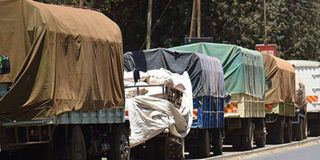How to avert a maize shortage crisis

Traders deliver maize to the National Cereals and Produce Board's Eldoret depot on February 12, 2019. In the past, surpluses in Uganda in particular have helped alleviate shortfalls in Kenya. PHOTO | FILE | NATION MEDIA GROUP
What you need to know:
- When the government gets too involved in the importation, it risks becoming an expensive loss-making one, with the taxpayer footing the bill.
- The apparent prevarication by the Agriculture Cabinet Secretary Mwangi Kiunjuri is straightforward neglect of one of the key mandates of his ministry, which is to ensure food security.
There is a growing war of words, with conflicting figures being given out on the exact position of maize stocks in the country.
From experience, I would be cautious and take the lower figures as being more accurate, bearing in mind losses due to inadequate storage conditions and so on.
Further to that, when it comes to food security, we should err on the side of such caution especially bearing in mind the time lags due to finding, paying for and transporting maize to Kenya from halfway around the world.
There is an additional factor to bear in mind. Both Uganda and Tanzania have also suffered adverse weather conditions, so there are little or no surpluses that will find their way over the border to Kenya.
In the past, surpluses in Uganda in particular have helped alleviate shortfalls in Kenya.
IMPORTS
Whatever the figure is of our exact stock position, it is crystal clear that we will need to import maize at some time in the not too distant future and until the end of the year at least.
The next main surplus crop will not come before December due to the late onset of the rains.
The apparent prevarication by the Agriculture Cabinet Secretary Mwangi Kiunjuri is straightforward neglect of one of the key mandates of his ministry, which is to ensure food security.
The government has a history of pretending there is no maize problem. In 2017, former Agriculture Cabinet Secretary Willy Bett talked down the problem until it was abundantly clear we needed to import.
STABLE PRICES
My take on the maize stock position is that when we add up the stocks with the various stakeholders, we have enough maize for the next two and possibly three months at most and will have to have maize on the high seas by early August.
We should also be strategic and mindful of the consumer. A supplement of imported maize from August onwards into the domestic market will help keep prices relatively stable and prevent price spikes as shortages start biting.
One cannot defy or talk down the laws of supply and demand. If the market is aware that stocks are dwindling, then prices will automatically be on the rise.
The preparation must start now so that a strategic plan is in place as soon as possible.
Furthermore, it must involve all stakeholders, importers and millers included, and must not be conjured up in the confines of the Agriculture ministry.
This is not an ‘us and them’ situation. At the end of the day, the greater the cooperation and synergy between all players, the more successful this massive logistical exercise is likely to be.
LOGISTICS
We need to be bringing in maize to fill a four to five-month gap. We are talking about an importation of 700,000 to 900,000 tonnes of maize for human consumption.
That requires a lot of coordination in the shipping, clearing and forwarding and countrywide distribution.
That is through a port that is already overwhelmed, often leading to inordinate delays in the clearing of cargo.
A duty-free window must be put into place from August to December 2019, so that importers and other players can plan accordingly.
That means such a notice should be gazetted as soon as possible so that planning can start now.
There is another crucial issue with regards to maize imports and indeed most of these logistical exercises where government is involved.
COMPETITION
When the government gets too involved in the importation, it risks becoming an expensive loss-making one, with the taxpayer footing the bill.
The name of the game should be for the government to facilitate the operation. That means it opens the import window for the quantity of maize needed, complete with timelines and duty waivers.
Then it should allow the private sector to undertake the exercise. The millers and relevant importers are already conversant with the international grain market in terms of what is available, where and at what price.
Remember it is the private sector that is importing most of the wheat we consume. To allow them to extend their skills and expertise in importing the maize, we will need will result in the country getting adequate maize at competitive prices.
COMMITMENT
There is another point to bear in mind. Kenya only has enough maize for domestic consumption when there has been adequate rain and a resultant good crop.
It often has to fall back on imports and all too often these imports become scam-ridden and much more expensive than they should be.
It is time to break that mould, and if Mr Kiunjuri is not the right person to oversee that exercise, then President Uhuru Kenyatta should replace him forthwith.
We are not talking about political poker here, but ensuring Kenyans get adequate supplies of their staple food at the best price possible.
Robert Shaw is a public policy and economic analyst: [email protected]





